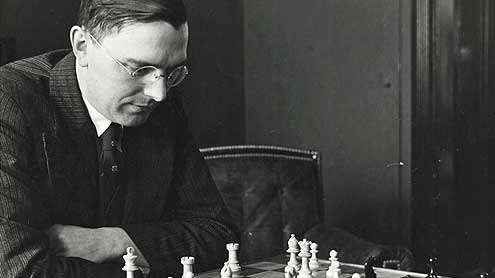Chess in the Netherlands
Chess in the Netherlands
When one thinks of the cultural history and achievements of the Netherlands, most often coming to mind is the largest city and capital, the beautiful, exciting, and historic Amsterdam.
Rushing to the mind are also Rembrandt, the Rijksmuseum, the Van Gogh Museum, and perhaps the Anne Frank House.

There is interest and estimable history not only in and around the capital, but also in Rotterdam, The Hague, Tilburg, and many other major cities and townships of this fascinating nation.
Much overlooked, however, is the rich history the country has in chess. The gem of this tradition is in the person of Max Euwe (born Machgielis Euwe, in the town of Watergraafsmeer, near Amsterdam, in 1901).
In 1935, Mr. Euwe became the fifth player to win the official world chess championship, and he held the title for two years. A respected mathematician, teacher, and author, he later held the post of President of FIDE, the international chess federation, from 1970 to 1978.
A modest and unassuming man, he was nearly universally respected and admired, and his tenure as FIDE President was marked by consistently ethical and pragmatic decisions during a stormy and challenging era in international chess.

Another Dutch chess Grandmaster who has left an indelible mark on the history of the game is Jan Timman. He was one of the world’s leading players from 1976 to 1994 and qualified as a Candidate (a specific chess term) for the world chess championship several times during this period.
Since he was considered the strongest non-Soviet player during that time, he earned the moniker “Best in the West.” His chess writing and editorial expertise also served to advance chess theory and practice.
In 1976 Viktor Korchnoi, the world’s then-current number two player, decided to defect from the Soviet Union for both personal and professional reasons. After the completion of a strong international chess event in Amsterdam, he sought and received political asylum.
It is little wonder that he chose to flee to the Netherlands, a nation noted for peace and reason. He later traveled to Switzerland and settled permanently there, yet has always spoken quite highly and fondly of his experiences in the Netherlands, his haven following an extremely turbulent time in his life.
Since the rise of international chess tournaments in the mid-19th century, several annual events have come to the fore, being considered the strongest and most noteworthy. One such series was the yearly invitational tournament in Tilburg, in the Netherlands.
Established in 1977, the event ran without interruption through 1994 and attracted the participation of a number of world chess champions, past, then-present, and future. The sponsorship of this tournament by Interpolis, a large insurance company, was likewise notable since it occurred during a period of increased corporate sponsorship of international chess and assisted in legitimizing and popularizing the practice.
Yet, few people outside of the chess world are aware that the much-publicized Tilburg tournament series did not constitute the first time that the forward-thinking and chess-respecting Netherlands had hosted an elite chess event, again sponsored by a corporate entity. The 1938 AVRO chess tournament stands as one of the premier events of all time.
Sponsored by the Dutch broadcasting company AVRO, the eight players generally considered the world’s best were brought together for a lengthy and grueling series of games through which the ultimate victor was to be considered the most worthy candidate for the next world championship match. The nearly month-long contest was played in various cities, among them Amsterdam, Rotterdam, Groningen, and The Hague.
While neither of the eventual co-winners played a match for the world championship, a precedent was set for high-visibility corporate chess sponsorship as well as elite invitational match tournaments leading to a challenger for the world title.
Later, in 1946, it was in Groningen that the first premier invitational chess event worldwide was held after the end of World War II. Again, the impressive field was populated by both past and future World Chess Champions. The Netherlands had once more made its mark on the chess world.
The more one learns, the more likely it is to discover that the Netherlands has been an important player in the history of international chess.


I’m always getting an education when I read your articles. Thanks, Andrew.
Thank you, as always, Kris.